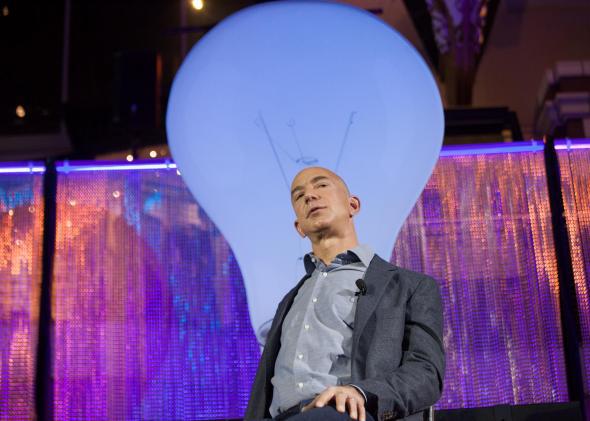Once again, Amazon appears to be putting the screws to a major publisher. According to the New York Times, the king of all Internet retailing “has begun discouraging” shoppers from buying Hachette releases by stretching out shipping times to two weeks or longer. Titles like Malcolm Gladwell’s Outliers and Stephen Colbert’s America Again: Re-Becoming the Greatness We Never Weren’t seem to be affected, along with books by J.D. Salinger, James Patterson, and others.
Hachette says it’s trying to supply Amazon with ample copies of its books, but Jeff Bezos & Co. are slowing down shipping to a crawl “for reasons of their own.” I think most of us are meant to interpret that as: “The fire-breathing Internet beast wants us to give them a price break.” Predictably, the episode is eliciting quite a bit of outrage from writers who are equally wary of said beast.
Amazon has, of course, applied similar hardball tactics in the past. It revoked the “buy” buttons for thousands of books in Macmillan’s catalog when the two companies were in a tiff over e-book prices and removed e-books from the Independent Publishing Group from its site entirely during another contentious negotiation. This is why many in the book world found it fundamentally unfair that the Justice Department saw fit to bring an antitrust case against publishers and Apple for banding together to force higher pricing on Amazon. Bezos gets to muscle the industry around, yet the publishers—as they would have you believe—are legally bound to sit helpless.
It’s a reminder that, for better or worse, our antitrust laws really have been sculpted with one idea in mind: low, low prices for the consumer. As long as Amazon’s actions seem designed to push down book prices long term, and it’s not colluding with other companies, the law will almost always work in its favor.
Here, it’s worth a short vocabulary review. When a company is the only seller in a market, it’s called “monopoly.” When it’s the only buyer, though, we call it a “monopsony.” When it plays hardball with publishers, Amazon is exercising its power as a massive book buyer. It’s not a true monopsonist, because it only controls about a third of the market, but you the get the idea.
Now here’s why the vocab matters. As a matter of law, courts don’t get as worked up about monopsony power as they do monopoly power. Here’s how litigator antitrust expert Jonathan Jacobson put it in a paper for the American Bar Association:
[T]he courts – while maintaining their ability to distinguish purely naked restraints from conduct that may in fact benefit consumers – appear guided by the simple intuition that buyer power tends to reduce prices, and that lower prices are good. That intuition does not always hold true. But it is correct often enough, and it has led to case law results that, in the main, promote antitrust’s goal of preserving competition for the benefit of consumers.
In other words, the courts love rock bottom prices. Amazon delivers them.
